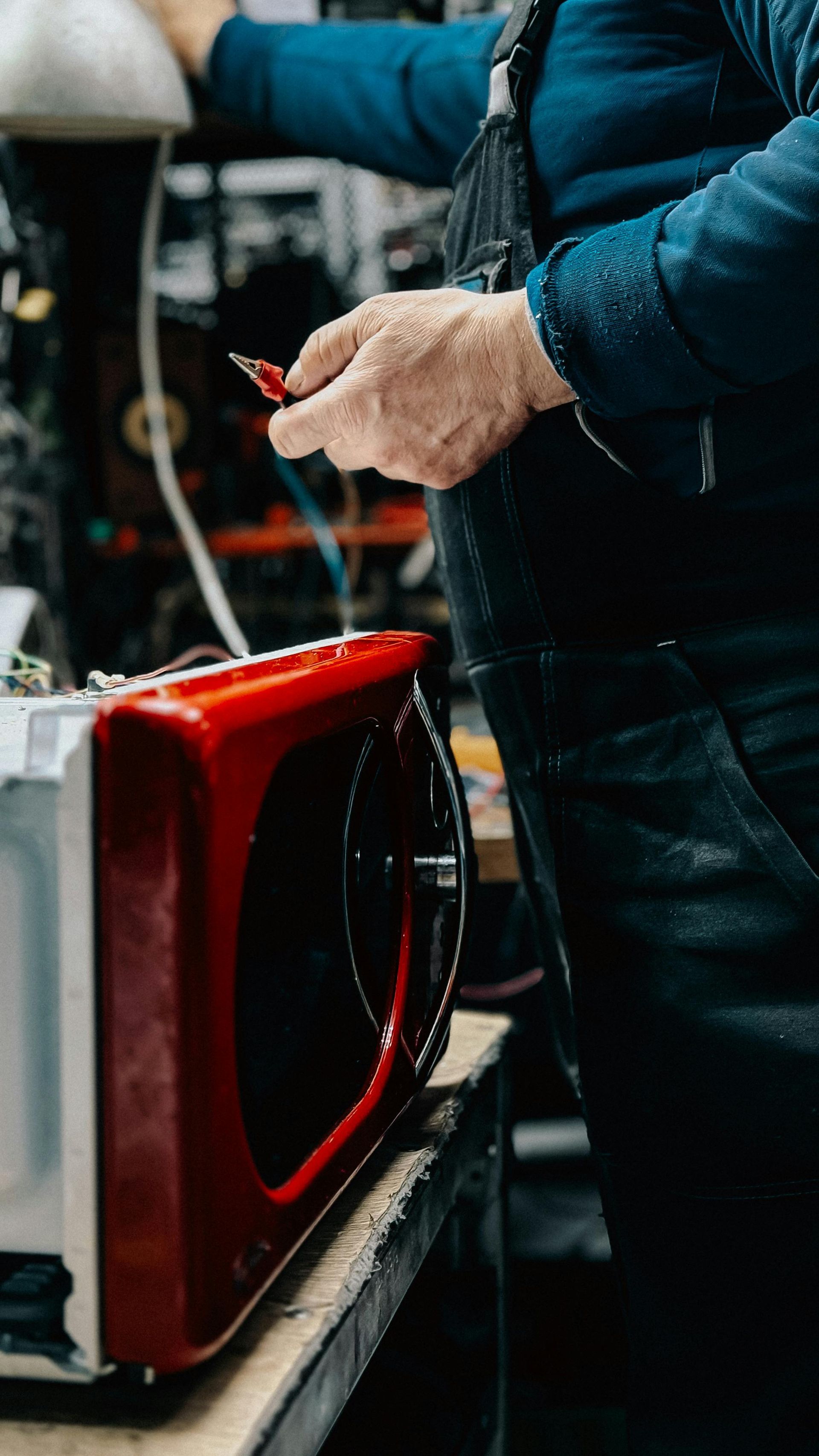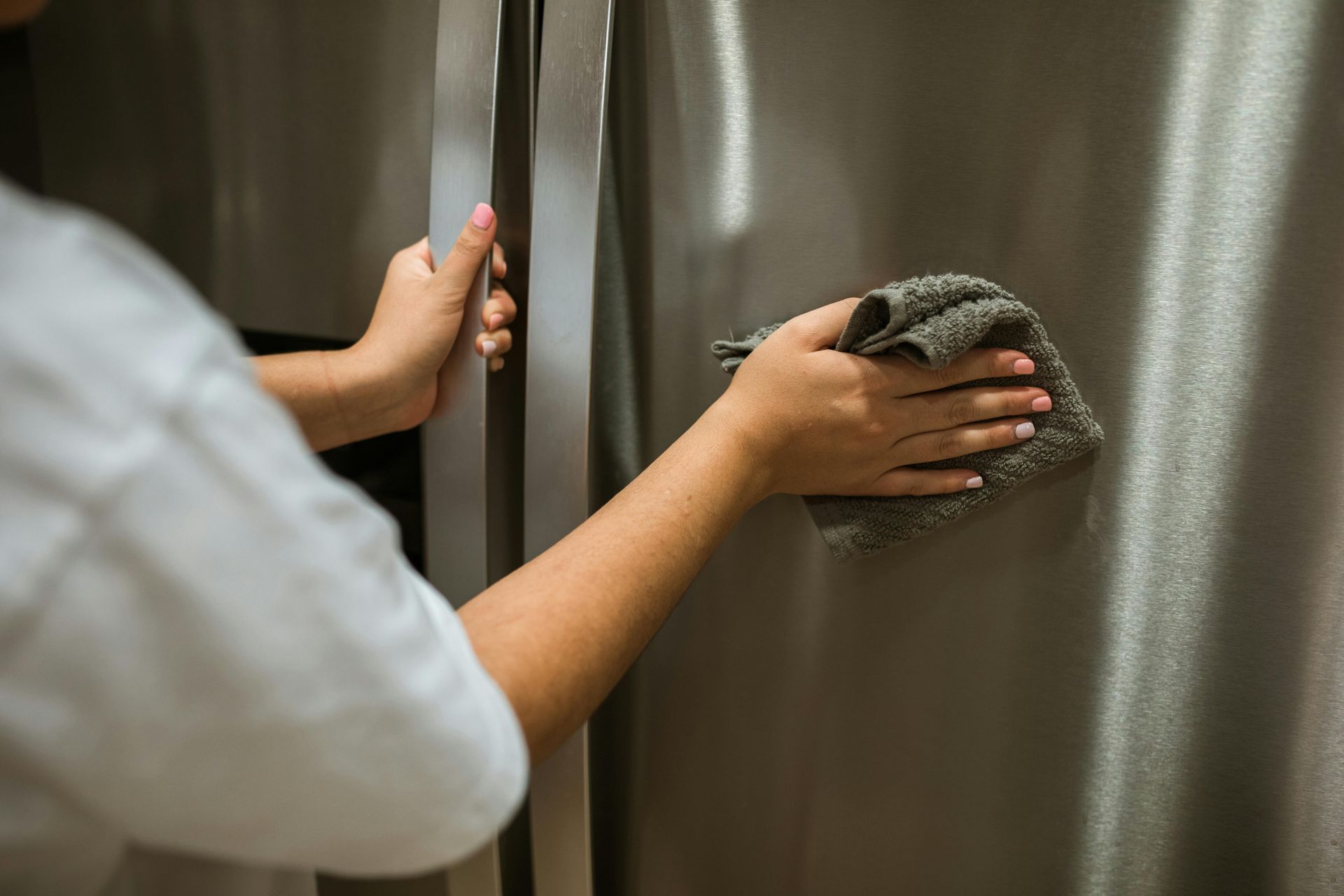How Often Should You Service Kitchen Appliances?
Regular servicing keeps kitchen appliances running smoothly and helps avoid sudden breakdowns. For example, check your fridge temperature and clean the coils twice a year. Inspect your oven and stove once a year. Clean your dishwasher filter every month, and wipe down your microwave and range hood weekly, changing filters as needed. Staying consistent with these tasks saves money and keeps your kitchen working efficiently, especially if you live in any of the service areas covered by local repair experts.
Key Takeaways
- Service ovens and stoves annually to prevent unexpected breakdowns and maintain safety.
- Clean refrigerator condenser coils once or twice a year to ensure energy efficiency.
- Inspect dishwasher hoses and filters every 1-2 months to avoid clogs and leaks.
- Wipe down microwave interiors weekly and check seals regularly to prevent odors and damage.
- Change or clean range hood filters every 1-3 months to maintain proper ventilation.
Refrigerator Maintenance Frequency
Your refrigerator works constantly to keep food fresh and drinks cold. Check its condition every six months to help it run efficiently. Keep the temperature between 37°F and 40°F to protect your groceries and save energy. Inspect the door seal to make sure it’s tight, since gaps let cold air escape and raise your electric bill. Wipe the seal occasionally to stop grime from building up. Clean the condenser coils once or twice a year so your fridge cools properly without overheating.
Oven and Stove Servicing Schedule
Service your oven and stove once a year to keep them working safely and evenly. If you notice uneven heating, strange smells, or burners not lighting properly, arrange for maintenance right away. Even if everything seems fine, annual checks help avoid costly repairs and keep your kitchen running smoothly.
Recommended Maintenance Frequency
Routine care extends kitchen appliance longevity and prevents surprise breakdowns. Keeping up with this schedule makes your kitchen safer and more efficient. If an urgent issue arises, consider emergency appliance repair services to prevent further damage.
Service your oven and stove at least once a year, and follow these simple steps:
- Inspect burners and heating elements every six months
- Deep clean oven and stove surfaces every three months
- Check thermostat accuracy once a year
- Examine gas connections or electrical cords annually
- Replace worn parts during service visits
- Signs Oven Needs Service
Wondering how to tell if your oven’s throwing a little tantrum? Keep an eye out for oven performance issues like uneven cooking or if it’s taking forever to heat up. Unusual smells, like burnt plastic or gas, are a big red flag. These signs mean it’s time to call in the pros before things get worse.
| Sign | What It Means | What To Do |
|---|---|---|
| Uneven cooking | Heating element problem | Schedule a service |
| Slow heating | Thermostat faulty | Get it checked |
| Unusual smells | Electrical or gas issue | Turn off & call technician |
| Oven won’t start | Igniter or wiring issue | Professional repair needed |
| Strange noises | Loose parts or motor issue | Service soon |
Dishwasher Cleaning and Inspection Intervals
Even though dishwashers handle tough jobs, they still need regular maintenance for better performance and longer life. Simple tasks keep your machine in top shape and prevent sudden breakdowns. Regular dishwasher maintenance ensures clean dishes and a hassle-free kitchen. For more insights, check out this article on how long a dishwasher should last.
Follow this checklist:
- Clean the filter monthly to prevent clogs and odors
- Wipe the door seals weekly to keep them flexible and stop leaks
- Run a vinegar cycle every one to two months to clear mineral deposits
- Inspect spray arms every three months for blockages
- Check hoses and connections twice a year for leaks or wear
Microwave Oven Care Recommendations
Clean your microwave weekly to keep it smelling fresh and working properly. Check the door seal and vents often to avoid bigger problems. Think of it as routine upkeep that saves you time and money. For broader advice on caring for all your appliances, visit this helpful guide on household appliance maintenance.
Cleaning Frequency Tips
A clean microwave keeps your kitchen feeling fresh and prolongs your appliance lifespan. Stick to these simple habits:
Wipe spills right away with a damp cloth
- Use water with lemon juice to steam-clean and deodorize the interior
- Skip harsh cleaners; mild soap works well
- Clean the turntable and door seals to prevent grime
- Leave the door open briefly after cleaning to air it out
Routine Maintenance Tasks
Since your microwave is one of the busiest appliances in your kitchen, giving it some routine love can really pay off. Following simple appliance longevity tips keeps it humming and your snacks tasty. Here’s a quick guide with routine cleaning guidelines to make your microwave last longer:
| Task | How Often |
|---|---|
| Wipe interior | After each use |
| Clean turntable | Weekly |
| Check door seals | Monthly |
| Deodorize | Every 2 weeks |
Range Hood and Ventilation System Checks
Your range hood works hard to remove smoke, steam, and odors. Keep your ventilation system in good shape with regular care. Ignoring it can reduce efficiency and leave your kitchen feeling stuffy. Changing filters is one of the easiest ways to maintain airflow.
Use this quick checklist:
- Change or clean filters every one to three months
- Wipe surfaces to remove grease buildup
- Listen for odd noises from the fan or motor
- Check ducts for blockages or leaks
- Test airflow to ensure strong ventilation
Coffee Maker and Small Appliance Upkeep
Although your coffee maker and other small appliances don’t need as much attention as larger appliances, a little care helps them work well and last longer. Clean your coffee grinder every few weeks to keep your beans tasting fresh. For espresso machines, descale monthly to prevent mineral buildup that affects taste and performance. Wipe down blenders and toasters, and check power cords for wear. These simple tasks keep your equipment running and help you avoid unexpected repairs. Treat your kitchen tools well, and they’ll keep delivering great results every day. And if you have an ice machine, remember that ice maker repair services can help keep it operating smoothly when problems arise.
Signs Your Kitchen Appliance Needs Immediate Servicing
Even with good care, kitchen appliances sometimes show signs they need attention. If you spot any of these problems, call a professional right away. Quick action keeps your kitchen running safely and helps your appliances last longer. And if you’re wondering whether it’s worth fixing your laundry appliances, this article on whether it’s worth repairing a washing machine can help you decide. You can also explore services for washer repair and dryer repair if your laundry machines act up.
Look for these appliance lifespan indicators and unusual noise alerts:
- New grinding or buzzing sounds
- Trouble heating or cooling properly
- Flickering lights or erratic power
- Water leaks or puddles under the appliance
- Longer running times without finishing the job
Frequently Asked Questions
Can I Service Kitchen Appliances Myself Safely?
Yes, you can safely handle basic kitchen appliance maintenance yourself. Always unplug the appliance first and follow the manual. Stick to simple tasks like cleaning filters, checking seals, or inspecting cords. For anything complex, it’s best to call a professional.
What Tools Are Needed for Appliance Servicing?
Common appliance servicing tools include screwdrivers, wrenches, cleaning brushes, and multimeters. A soft cloth, mild detergent, and a vacuum with a brush attachment are also useful for routine maintenance.
How Does Servicing Affect Appliance Warranty?
Regular servicing helps protect your appliance warranty. Skipping maintenance or attempting major DIY repairs without proper knowledge could void the warranty. Always follow the manufacturer’s guidelines.
Are There Eco-Friendly Servicing Options?
Yes, you can choose eco-friendly appliance servicing methods. Use natural cleaners like vinegar or baking soda, replace worn parts instead of entire units, and maintain energy efficiency through regular upkeep.
Can Regular Servicing Reduce Energy Bills?
Yes, regular servicing keeps appliances running efficiently, which can lower your energy bills. Clean filters, tight seals, and well-maintained parts all help reduce power use over time.
Final Thoughts
Regular care for your kitchen appliances pays off in fewer repairs and better performance. Stick to maintenance schedules, watch for warning signs, and call a professional when needed. Keeping your appliances in good shape saves time and money, making your kitchen a more enjoyable place to cook and gather. If you’re ready for help or looking to save on services, check out the latest
special offers. And if you have questions or want to book a visit,
contact us today.



